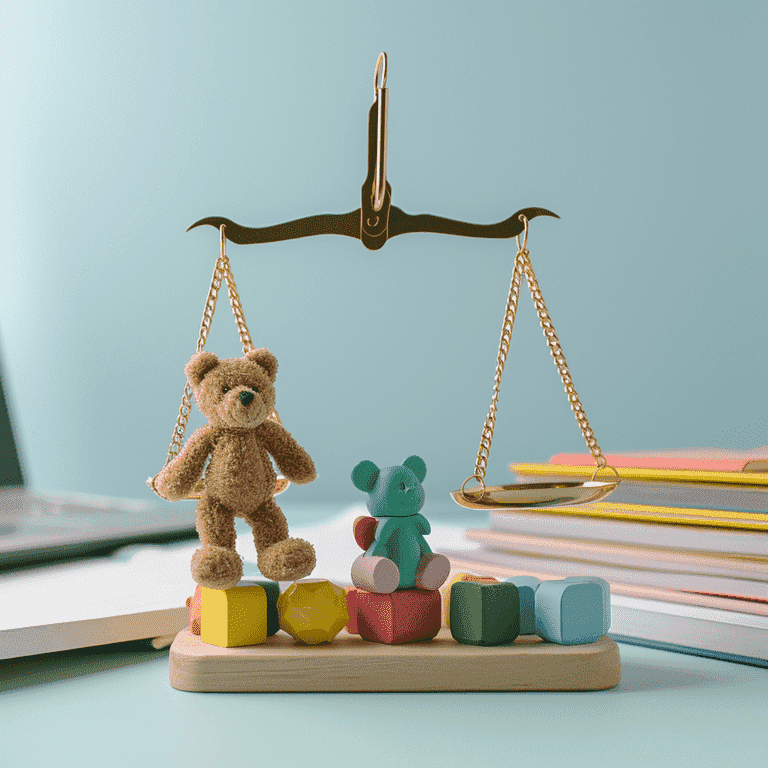Child custody is a critical issue that affects many families in Las Vegas. If you’re getting divorced, you must understand Nevada’s custody types. This guide aims to demystify legal jargon. It provides clear, short information about child custody in Las Vegas.

Importance of Knowing Different Custody Types
Knowing the types of custody helps you make informed decisions. This is for the well-being of your children. It’s not just about the law. It’s about ensuring your children’s future is secure and stable. We’re here to guide you through custody law. We’ll do it in a way that’s easy to understand and relevant to you.

Legal Framework for Custody in Las Vegas
Nevada State Laws Governing Child Custody
Nevada state laws govern child custody in Las Vegas. These laws lay out the legal principles and procedures for determining custody arrangements. They put the child’s best interests first. They also provide guidelines for fair custody decisions.
Role of Las Vegas Courts in Custody Decisions
The courts in Las Vegas play a pivotal role in custody decisions. Judges consider various factors to determine the most suitable custody arrangement. They base their choices on legal principles. They also consider each family’s unique circumstances.
The Reason You Haven’t Hired A Child Custody Attorney Yet
We’re ready to fight for the rights of your family if you hire us. We’re waiting to jump into action on the behalf of your family.
Primary Types of Custody
Physical Custody
Definition and Legal Implications
Physical custody is about where the child lives. It is about who is responsible for their day-to-day care. This type of custody has big implications for the child and the parents. It affects everything from schooling to daily routines.
Sole Physical Custody
What Sole Physical Custody Entails
One parent has sole physical custody. The child resides with them. The other parent may have visitation rights. This arrangement is usually chosen when one parent is deemed more fit to provide daily care.
Circumstances Leading to Sole Physical Custody
Several factors can lead to sole physical custody. For example, one parent may be unable to provide a stable environment. They may have issues like substance abuse.
Joint Physical Custody
Understanding Joint Physical Custody
Joint physical custody means the child lives with both parents for significant periods. This setup requires a lot of parent cooperation. It’s needed to keep the child stable.
How Courts Determine Joint Physical Custody
The court considers factors. These include the parents’ proximity, their work schedules, and the child’s needs. They use these to decide if joint physical custody is possible.
Legal Custody
Explanation of Legal Custody
Legal custody involves decision-making authority regarding the child’s education, health, and welfare. It’s about who makes significant decisions in the child’s life.

Sole Legal Custody
Characteristics of Sole Legal Custody
One parent can make crucial decisions for the child in sole legal custody. This type of custody is rare. It is awarded when joint decision-making is not best for the child.
Situations Favoring Sole Legal Custody
Situations like a history of domestic violence, child abuse, or severe parent conflict might lead to sole custody decisions.
Joint Legal Custody
Concept of Joint Legal Custody
Both parents have an equal say in major decisions. This is under joint legal custody. It’s the most common form of legal custody in Las Vegas.
Factors Influencing Joint Legal Custody Decisions
The court considers the parents’ ability to communicate and cooperate. It looks at this, along with other factors, when granting joint legal custody.

Special Considerations in Custody Cases
Best Interests of the Child Standard
Like in the rest of Nevada, the child’s best interests are paramount in custody decisions in Las Vegas. This standard is more than a legal term. It’s a commitment to ensuring that the child’s health, happiness, and development come first. It guides all custody decisions.
Elements Considered in the Best Interests Standard
Judges consider various elements to determine what’s best for the child:
The child’s age and gender
Each parent’s relationship with the child
The child’s physical and emotional needs
The ability of each parent to meet these needs
Role of Child’s Preference in Custody Decisions
As children grow older, their preferences gain more weight in court. However, this is just one of many factors considered. A child’s wish is not the only factor in custody outcomes.
Modification of Custody Orders
Custody arrangements are not set in stone. Life changes, and so do the needs of your family.
Grounds for Modifying Custody Orders
Modification might be considered if:
There’s a significant change in one parent’s circumstances
The child’s needs have evolved over time
One parent is not adhering to the custody arrangement
Legal Process for Custody Modification
Changing a custody order involves:
Filing a petition for modification
Demonstrating a substantial change in circumstances
Proving that the amendment is in the child’s best interests

Understanding Custody Agreements
Crafting a Custody Agreement
Creating a custody agreement is about laying a roadmap for co-parenting. It’s a document. It outlines how you and your ex-partner will raise your child after the separation.
Critical Components of a Strong Custody Agreement
A comprehensive custody agreement includes the following:
An apparent custody and visitation schedule
Guidelines for decision-making
Provisions for holidays, vacations, and special occasions
Arrangements for transportation and exchanges
Legal Assistance in Drafting Custody Agreements
You can draft an agreement yourself. But, having a legal pro review it ensures it meets legal standards and covers all needed details.
Enforcing Custody Agreements
Once a custody agreement is in place, it’s legally binding.
Legal Remedies for Custody Agreement Violations
If one parent violates the agreement, legal remedies include:
Mediation to resolve the issue
Filing a motion with the court
Enforcement actions, which can range from makeup visitation time to legal sanctions
Court Involvement in Custody Enforcement
In serious violations, the court can step in to ensure compliance. If needed, it can change the custody arrangement.

Navigating Custody Disputes
Conflict Resolution in Custody Disputes
Disputes are common, but they don’t always need to end up in court.
Mediation and Negotiation Strategies
Using a neutral third party to facilitate discussions
Focusing on the child’s best interests to find common ground
Developing a parenting plan that works for both parties
Legal Representation in Custody Disputes
In more contentious cases, a lawyer can help navigate the legal complexities. They can also advocate for you and your child.
Court Trials for Custody
Sometimes, court intervention is unavoidable.
Preparing for a Custody Trial
Preparation involves:
Gathering relevant documents and evidence
Understanding your legal rights and responsibilities
Working closely with your attorney to build your case
What to Expect During Custody Litigation
Custody litigation can be a lengthy and emotional process. It typically includes:
Presenting evidence and arguments
Witness testimonies
A judge’s decision based on the child’s best interests

Breaking It All Down
Dealing with custody issues can be complex and emotionally taxing. That’s why professional legal guidance is invaluable.
A good attorney can help you navigate the law. They’ll help you understand your rights and fight for the best outcome for your child.
They can also help draft strong custody agreements. They can support you in disputes and when changes are needed.

Frequently Asked Questions
How is child support determined in joint physical custody cases in Las Vegas?
In joint physical custody, child support is usually based on the income of both parents. It also accounts for the time each parent spends with the child. Nevada’s child support guidelines consider parents’ incomes. They also consider the number of children and the custody arrangement. These factors determine the appropriate amount.
Can a custody decision be appealed in Las Vegas?
Yes, custody decisions can be appealed in Las Vegas. A parent can appeal a decision. They can do so if it was based on wrong legal principles or missed evidence. However, it’s important to note that appeals are complex. They require solid legal reasons.
How does relocation affect custody arrangements?
If a parent plans to move far away, this can greatly affect custody arrangements. The moving parent must give notice. The court will consider how the move will affect the child and the custody arrangement. The court may require a modification of the custody order to accommodate the change.
What role do child custody evaluators play?
They are professionals, often psychologists or social workers. They assess the family and recommend custody to the court. They consider the child’s needs, parental abilities, and any factors affecting their well-being.
How is a child’s preference considered in custody decisions?
A child’s preference is one of many factors considered. But, it becomes more important as the child ages. In Las Vegas, courts may give much weight to the wishes of a child. This is especially true for those over 12. But, the decision will be based on the child’s best interests.
What happens if a parent violates a custody order?
If a parent violates a custody order, the other parent can file a motion with the court to enforce the order. The court may take many actions. These include changing the custody arrangement. They also include ordering makeup visits. In severe cases, they involve imposing legal sanctions.
Can grandparents request custody or visitation rights in Las Vegas?
Yes, under certain circumstances, grandparents can request custody or visitation rights. The court will consider the child’s best interests. They will look at the relationship between the grandparents and the child. They will also consider any factors that might harm the child.
How does domestic violence affect custody decisions in Las Vegas?
Domestic violence is taken very seriously in custody decisions. If one parent has a history of domestic violence, this can greatly affect their ability to get custody. The court puts the child’s safety first. This can lead to limited or supervised visits for the offending parent.
Are there any resources for parents to help children adjust to new custody arrangements?
Yes, there are resources available. Many family therapists specialize in helping children and parents. They help them navigate the changes in family dynamics. Parenting classes and support groups can offer guidance and support during the transition.
How can unmarried parents establish custody rights in Las Vegas?
Unmarried parents have the same custody rights as married parents. However, they may need to establish paternity or maternity legally. Once paternity is established, the father has the same rights. He can seek custody or visitation like a married father.

Glossary
Physical Custody: Refers to the right of a parent to have a child live with them. It involves providing day-to-day care for the child.
Legal Custody: The authority to make significant decisions about a child’s welfare, including education, healthcare, and religious upbringing.
Sole Physical Custody: An arrangement where the child resides primarily with one parent while the other may have visitation rights.
Joint Physical Custody: A custody arrangement where the child lives with each parent for significant periods, requiring a high degree of cooperation between the parents.
Sole Legal Custody: One parent has the exclusive right to make significant decisions about the child’s life.
Joint Legal Custody: Both parents share the responsibility and authority to make significant decisions regarding their child’s upbringing.
Best Interests of the Child: A standard used by courts to make custody decisions, focusing on ensuring the health, safety, and well-being of the child.
Custody Modification: A change made to an existing custody order, usually due to a significant difference in circumstances.
Custody Agreement: A legally binding document outlining the terms of custody and visitation between parents.
Custody Order: A court order defining the custody arrangement for a child, including who has physical and legal custody.
Child Support: Financial payments made by one parent to another to help cover the costs of raising a child.
Appeal: The process of requesting a higher court to review and change a lower court’s decision.
Relocation: Moving to a new location can impact existing custody arrangements and may require court approval or a modification of the custody order.
Child Custody Evaluator: A professional, often in psychology or social work, who assesses the family and recommends custody and visitation to the court.
Visitation Rights: The rights granted to the non-custodial parent to spend time with their child.
Domestic Violence: Acts of violence or abuse within a domestic setting that can significantly impact custody decisions.
Grandparent Rights: Legal rights that grandparents may have to visitation or custody of their grandchildren under certain circumstances.
Paternity: Legal acknowledgment of a man as the father of a child, often required for unmarried parents to establish custody rights.

Additional Resources for You
For our valued readers navigating the complexities of family law, we’re pleased to remind you that our lead attorney, Molly Rosenblum Allen, Esq, has created a wealth of resources to assist you during these challenging times. Below is a list of comprehensive guides and articles that can provide you with vital information and support:
Las Vegas Custody Attorney: Your essential guide to navigating child custody in Las Vegas, offering in-depth knowledge and legal expertise. Read more.
Fathers Rights: A dedicated resource for fathers seeking to understand and protect their legal rights in custody matters. Learn more.
Supervised Visitation: An informative piece that sheds light on the nuances of supervised visitation and what you need to know. Discover the details.
Changing Custody Agreement: A practical guide for Nevadans looking to understand the process of modifying custody agreements. Get the facts.
Grandparents Rights Nevada: An overview of the rights grandparents have in Nevada concerning visitation and custody of grandchildren. Explore your rights.
Long Distance Co-Parenting: Tips and advice for managing the challenges of co-parenting across distances in Nevada. Find out how.
How a Mother Can Lose a Custody Battle: Insightful information on the pitfalls that could affect a mother’s custody rights. Understand the risks.
Custody Battle Tips for Nevadans: Strategic advice to help you navigate the complexities of a custody battle in Nevada. Gain an edge.
What Not To Say In Child Custody Mediation: Guidance on how to communicate effectively and avoid common mistakes in custody mediation. Speak wisely.
How Much is a Custody Lawyer: A breakdown of the costs associated with hiring a custody lawyer in Las Vegas. Budget accordingly.
At What Age Can a Child Decide to Stop Visitation: Information on the age at which a child’s preferences are considered regarding visitation in Nevada. Know the law.
These resources are designed to offer clarity and confidence as you proceed with your family law matters. For further assistance, don’t hesitate to reach out to The Rosenblum Allen Law Firm where experienced professionals are ready to help.

Outside Resources for You
Here are several offsite resources that can provide additional valuable information and support related to child custody and family law:
American Bar Association (ABA) – Family Law Section: This section of the ABA offers resources, publications, and helpful articles on family law, including child custody matters. Visit ABA Family Law
FindLaw – Family Law Center: FindLaw’s Family Law Center has a wealth of articles and resources on divorce, child custody, child support, and other family law issues. Visit FindLaw Family Law
National Council of Juvenile and Family Court Judges (NCJFCJ): This organization provides research, training, and resources to assist family court judges and practitioners in making informed decisions in family law cases. Visit NCJFCJ
National Association of Counsel for Children (NACC): The NACC advocates for children’s rights in the legal system and provides resources and training for legal professionals involved in child welfare, juvenile justice, and family law. Visit NACC
Child Welfare Information Gateway: This service from the U.S. Department of Health and Human Services offers information and resources on a wide range of child welfare topics, including family law and custody issues. Visit Child Welfare Information Gateway
Psychology Today – Divorce Section: Psychology Today offers articles and insights from mental health professionals on coping with divorce and custody issues, focusing on the emotional and psychological aspects. Visit Psychology Today Divorce
KidsHealth from Nemours – For Parents: This resource offers guidance and articles on how to help children cope with family issues like divorce and custody, providing a child-centric perspective. Visit KidsHealth for Parents
These resources can provide additional support, information, and guidance on various aspects related to child custody and family law, complementing the information provided in the guide.

A Special Message from Our Lead Attorney, Molly Rosenblum Allen, Esq

Dear Reader,
Thank you for taking the time to explore our resources. I hope you found them helpful. They explain the complexities of child custody and family law.
If you’re in a situation that needs legal help, please reach out. My team and I at The Rosenblum Allen Law Firm are here to guide you through the legal process. We will also provide the support and representation you need.
To get the ball rolling on your situation, please call us at (702) 433-2889. We commit to helping you navigate your legal challenges. We will do so in a professional and careful manner.
Looking forward to assisting you,
Molly Rosenblum, Esq.


